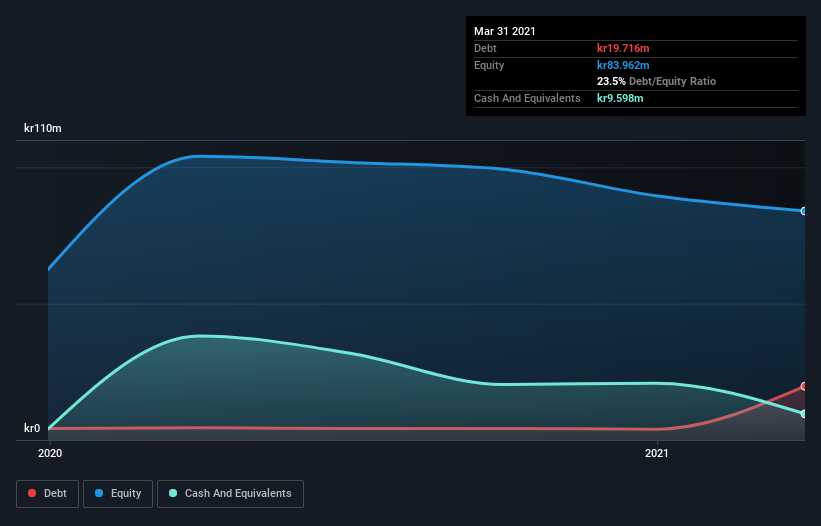
Warren Buffett famously said, 'Volatility is far from synonymous with risk.' So it seems the smart money knows that debt - which is usually involved in bankruptcies - is a very important factor, when you assess how risky a company is. We note that Qlife Holding AB (publ) (STO:QLIFE) does have debt on its balance sheet. But is this debt a concern to shareholders?
When Is Debt A Problem?
Debt is a tool to help businesses grow, but if a business is incapable of paying off its lenders, then it exists at their mercy. Part and parcel of capitalism is the process of 'creative destruction' where failed businesses are mercilessly liquidated by their bankers. However, a more frequent (but still costly) occurrence is where a company must issue shares at bargain-basement prices, permanently diluting shareholders, just to shore up its balance sheet. Of course, the upside of debt is that it often represents cheap capital, especially when it replaces dilution in a company with the ability to reinvest at high rates of return. When we think about a company's use of debt, we first look at cash and debt together.
View our latest analysis for Qlife Holding
What Is Qlife Holding's Debt?
You can click the graphic below for the historical numbers, but it shows that as of March 2021 Qlife Holding had kr19.7m of debt, an increase on kr4.45m, over one year. However, it does have kr9.60m in cash offsetting this, leading to net debt of about kr10.1m.

A Look At Qlife Holding's Liabilities
The latest balance sheet data shows that Qlife Holding had liabilities of kr33.2m due within a year, and liabilities of kr4.22m falling due after that. On the other hand, it had cash of kr9.60m and kr20.3m worth of receivables due within a year. So it has liabilities totalling kr7.56m more than its cash and near-term receivables, combined.
This state of affairs indicates that Qlife Holding's balance sheet looks quite solid, as its total liabilities are just about equal to its liquid assets. So it's very unlikely that the kr577.5m company is short on cash, but still worth keeping an eye on the balance sheet. The balance sheet is clearly the area to focus on when you are analysing debt. But it is Qlife Holding's earnings that will influence how the balance sheet holds up in the future. So if you're keen to discover more about its earnings, it might be worth checking out this graph of its long term earnings trend.
In the last year Qlife Holding wasn't profitable at an EBIT level, but managed to grow its revenue by 350%, to kr57m. That's virtually the hole-in-one of revenue growth!
Caveat Emptor
Despite the top line growth, Qlife Holding still had an earnings before interest and tax (EBIT) loss over the last year. To be specific the EBIT loss came in at kr31m. When we look at that and recall the liabilities on its balance sheet, relative to cash, it seems unwise to us for the company to have any debt. So we think its balance sheet is a little strained, though not beyond repair. However, it doesn't help that it burned through kr46m of cash over the last year. So suffice it to say we consider the stock very risky. There's no doubt that we learn most about debt from the balance sheet. But ultimately, every company can contain risks that exist outside of the balance sheet. For instance, we've identified 4 warning signs for Qlife Holding (1 can't be ignored) you should be aware of.
If you're interested in investing in businesses that can grow profits without the burden of debt, then check out this free list of growing businesses that have net cash on the balance sheet.
When trading Qlife Holding or any other investment, use the platform considered by many to be the Professional's Gateway to the Worlds Market, Interactive Brokers. You get the lowest-cost* trading on stocks, options, futures, forex, bonds and funds worldwide from a single integrated account. Promoted
Valuation is complex, but we're here to simplify it.
Discover if Qlife Holding might be undervalued or overvalued with our detailed analysis, featuring fair value estimates, potential risks, dividends, insider trades, and its financial condition.
Access Free AnalysisThis article by Simply Wall St is general in nature. It does not constitute a recommendation to buy or sell any stock, and does not take account of your objectives, or your financial situation. We aim to bring you long-term focused analysis driven by fundamental data. Note that our analysis may not factor in the latest price-sensitive company announcements or qualitative material. Simply Wall St has no position in any stocks mentioned.
*Interactive Brokers Rated Lowest Cost Broker by StockBrokers.com Annual Online Review 2020
Have feedback on this article? Concerned about the content? Get in touch with us directly. Alternatively, email editorial-team (at) simplywallst.com.
About OM:QLIFE
Qlife Holding
A med-tech company, manufactures and sells in-vitro diagnostic analyzers and reagents in Sweden.
Medium-low with imperfect balance sheet.
Market Insights
Community Narratives




